Remembering Chris Stevens: My Journey to Ouaouizerth
Melanie Kondrat (Morocco 2012-14) is working in Youth Development in Morocco. From Tacoma, Washington, she graduated from Gonzaga University in 2011. She blogs about her Peace Corps tour at www.postgradmel.com. Melanie gave me permission to reprint her touching account of her trip back to Ouaouizerth where Chris was a PCV.
Remembering Chris Stevens: My Journey to Ouaouizerth
by Malanie Kodrat (Morocco 2012-14)
I like to think that if I had been a Peace Corps volunteer in Morocco in the early 80’s Chris Stevens and I might have been friends.
Maybe we would’ve bonded over our mutual love for the Tadla-Azilal province. For the mountains that surround us. For the red dirt that threatens to stain our clothes every day. For the generous culture of the Amazigh people who’ve inhabited this region for ages.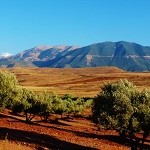
Or maybe we would’ve bonded over a love for the West Coast (Best Coast). We might’ve compared notes on our favorite hiking trails. I probably would’ve tried to convince him that Mt. Rainier is far superior to any mountain they have in California.
Perhaps our time would’ve been spent trying to make sense of some of the more amusing, at times ludicrous aspects of life as a Peace Corps volunteer. The cultural mishaps, language woes, highs, lows, ‘Aha!’ moments, etc.
Nearly 30 years have passed since Stevens began his service in Morocco. 30 years is a long time. But I also like to think that some aspects of service in the Peace Corps transcend time and technology. He might not have been able to relate to the magic that is an external hard drive loaded with TV shows and movies, but he would’ve related to the magic that is a hot shower. He would’ve understood how meaningful it is to master certain aspects of Darija because 30 years doesn’t change the fact that it’s still not a written language. He would’ve understood the intricacies of Moroccan culture; standard greetings, eating with the right hand only, sticking to your triangle in a tagine, etc.
I guess what I’m trying to get at is that Stevens was human. That prior to his days of law and Foreign Service, he was someone like me (or like a lot of volunteers) trying to figure out a little about himself and the world in the midst of this adventure. When I found out via other volunteers that Stevens served in a town relatively close to mine I felt compelled by his story. Compelled to find out more about this man, his service, his community, etc. in the hopes of shedding a little bit more light into the root of his passion for North Africa.
The plan was to travel to Ouaouizerth via taxi with my sitemate Emily and my counterpart Aziz. I pitched the idea to Aziz the week before and he enthusiastically agreed to accompany us in the role of translator. Aziz was integral to the plan. He was the one who suggested we start at the high school and go from there.
Of all the acronyms, sayings, and mantras that the Peace Corps attempts to impart on its volunteers one of the most important is: Never work alone.
Counterparts are essential to sustainability and success, not to mention getting in the door.
The road to Ouaouizerth winds through the Middle Atlas Mountains. It’s hard not to feel like you’re in the middle of nowhere as you ascend higher, for to look out is to see nothing but green. If it sounds cliché to say it was a beautiful day, then so be it. It was a beautiful day. I snagged a front seat next to the window, enabling me to enjoy a gentle breeze and gaze with content at my surroundings. The closer you get to Ouaouizerth, the view opens up. Ouaouizerth is settled in a valley of sorts, surrounded 360 degrees by mountains and rolling hills, nestled a few kilometers from the shores of the region’s lake Bin El Ouidane. The descent into Ouaouizerth is tree lined like out of a storybook and it’s not difficult to imagine why Stevens would’ve loved this area so much.
We arrived midafternoon while the town was sleepy. It’s a quaint town, equipped with the usual sights of mountain towns in Morocco. Cafés, pharmacies, hanuts, all-purpose stores, etc. Curiously there are remnants of French colonialism left over, noticeably homes with sloped roofs and windows with crown molding. After lunch, we meandered over to the high school which exists on the far edge of town.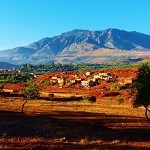
Here’s where things got interesting.
I had planned getting to Ouaouizerth. I had thought about questions I might ask people who knew Stevens. But I hadn’t actually thought about what would happen when we showed up at the high school. For all the informality that exists in Moroccan culture, the Moroccan education system makes up for it. The affairs of education are very formal. Often just getting into the building requires various signatures, clearances, stamps, etc.
This little caveat is something I am well aware of, given my hopes to teach at the high school this fall. Somehow however, it slipped my mind. Better to ask forgiveness then to ask permission, right? Worst case scenario they’d send us home.
Thankfully, Aziz was able to work a little magic. By which I mean he spoke Darija and explained to the administrators that we weren’t tourists, but are Peace Corps volunteers like Stevens. Once we were able to communicate this idea, the doors opened up- literally and figuratively.
We met with the principal, teachers who worked with him, people who knew of him; nearly everyone we met had something to say about him. They lauded him as a great man, excellent teacher, beloved by the community, and everyone expressed deep sorrow at learning of his passing.
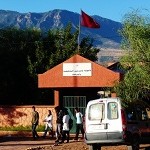
Where Chris taught
The most compelling and in depth recount of Stevens came from an English teacher at the high school, Lahcen, who was one of Stevens’ students.
Much has been said about Stevens’ work as a diplomat, but little has been said about his work as a Peace Corps volunteer. Which left me to wonder, just who was Chris Stevens? With the help of Lahcen, I was able to find out a bit more.
Chris Stevens was always smiling. Never in a bad mood.
He was not interested in himself. He devoted all his time to teaching and learning Moroccan Arabic.
He was the kind of guy who carried a notebook in his back pocket and would write new words down and practice them; a fact which endeared me to him since I do the same.
Stevens was a model teacher. He provided extra hours after the school day was finished to his most dedicated English students.
He was personable. Always listening. The kind who made you feel like what you have to say is important.
Stevens was inspirational. Lahcen cited Stevens as the reason he became an English teacher. He remembers uttering his first English words at the request of Stevens. ‘What’s your name?’
Also according to Lahcen, “Any qualities that were good- he had it.”
He was active. Always on foot. Fond of hiking and jogging. Every afternoon between five and six Stevens would jog along the dirt path to the village right outside Ouaouizerth and would often stop by Lahcen’s house. He would drink tea and practice Tamazight with Lahcen’s mother.
On Friday’s he liked to play basketball with his students. Afterwards they would sit around and talk. They were always talking about different things.
Stevens was interested in Moroccan culture. Described as being tolerant. He showed respect to the standards of the community by jogging in track suits as opposed to shorts.
From a volunteer standpoint, Stevens was smart. He lived close to souk.
He was the kind of teacher who gave back tests outside of class, so as to save embarrassment.
Lahcen also pointed out that Stevens always wore the same khakis, track jacket, white polo, and tennis shoes. A fact which Emily and I found particularly amusing as most volunteers have a disdain for laundry and often wear many of the same clothes day after day.
Lahcen provided us with an incredibly rich portrait of the kind of person and volunteer Stevens was. As our time at the high school drew to a close, we were blessed with the opportunity to visit the home where Lahcen grew up, where Stevens spent many afternoons. We met with Lahcen’s brother, Ali, who being close in age to Stevens considered him a friend. Over tea and bread, we were able to learn more about Stevens, view some photos, talk about the Peace Corps, and more. It was with great hope and satisfaction that I left Ouaouizerth that afternoon.
I wish I could better describe how meaningful this experience was. I wish my words and images were capable of explaining why that day was the best day I have had thus far in my service. But I’m afraid they fall too short. But I will say this:
The legacy of Chris Stevens speaks to what service in the Peace Corps is all about; it’s proof that the Peace Corps is relevant. Opponents of the Peace Corps might argue that it’s a money drain, that its results aren’t quantifiable, that it’s resume padding for overachieving post grads who aren’t ready to enter the “real world,” etc.
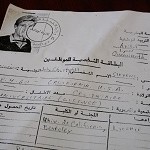
Chris in the Peace Corps
All to which I respond, how? How can money be wasted in the spirit of diplomacy and fostering peace between nations? How can you measure the extent to which you’ve changed someone’s life? How do you define the “real world?” And who’s to say that Peace Corps volunteers aren’t living in it?
It means something that nearly 30 years after Stevens served in Ouaouizerth people still talk about him. That when I met with counterparts last week the first thing they expressed to me was their condolences for his death. That when word got out about his passing the entire community of Ouaouizerth mourned, even people who never knew him. And moreover, that every single person who knew him lauded him as a great man with a compassionate heart.
Stevens was a model Peace Corps volunteer, ambassador, and citizen. But more than that, Stevens was a model human being. Someone with a passion for service to others and an inclination to leave this world a little better than it was before.
Well done sir.
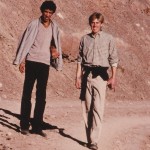
Well done? Absolutely
Well said? Absolutely
Thank you.
Walking in the tracks of a great human being is an experience you’ll never forget. Thanks for inviting us to follow you, Malanie. Chris Stevens is a hero to many Moroccans and, as you say, a shining example of a true human being.
John, thanks so much for posting this ….. what a read!!!! Ever since this terrible event, I have thought what an honor it would have been to know Chris Stevens and to have been able to call him a friend … this blog of Melanie’s almost makes that possible.
Reading this at the end of Melanie’s own funeral mass. Brought here by her sister’s moving eulogy. God bless Melanie and may we never underestimate the profound impact our words and deeds have on others, even those who witness at a distance.